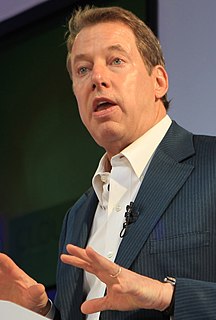A Quote by Simon Mainwaring
Corporations, consumers, and citizens must begin acting in concert to create a powerful third pillar of social transformation if we hope to meet the social challenges we currently face with equal force. This begins with corporations that choose to alter how they practice capitalism in two ways to serve the greater good.
Related Quotes
The right tends to posit that the market fuels social good. The left tends to posit that the government fuels social good. At bottom, democracy claims that citizens drive social good, but there is currently no container for a political force-field that stakes claim to the unbelievable resources now virtually untapped in every man, woman, and child in our society.
In the early 1970s, Milton Friedman argued that corporations should not be socially responsible because they had no mandate to be; they existed to make money, not to be charitable institutions. But in the economy of the 21st century, corporations cannot be socially responsible, if social responsibility is understood to mean sacrificing profits for the sake of some perceived social good. That's because competition has become so much more intense.
The nature of the state is one thing, but there are other major challenges - what it will take to tackle the issues of social corruption, for example, social justice, and the economic system - and what are the future challenges when it comes to equality between the citizens, in particular in the field of the job market and equal opportunity for men and for women? This is at the centre of the question that is the Arab Awakening.
Corporations are a good thing. But corporations should not be running our government... They have driven the American economy since its founding, and the prosperity of our country is largely dependent on the free operation of corporations. But some corporations don't want free markets, and they don't want democracy. They want profits.
I think one purpose is very clear among corporations and business leaders: make profits, deliver high return for stockholders, conquer markets, service consumers and create jobs. But in today's world, demands from corporations and leaders are much more than that. We need to understand what people really want at the very end.
We've now become conscious of the uncalculated social, economic, and environmental costs of that kind of "unconscious" capitalism. And many are beginning to practice a form of "conscious capitalism," which involves integrity and higher standards, and in which companies are responsible not just to shareholders, but also to employees, consumers, suppliers, and communities. Some call it "stakeholder capitalism."
































